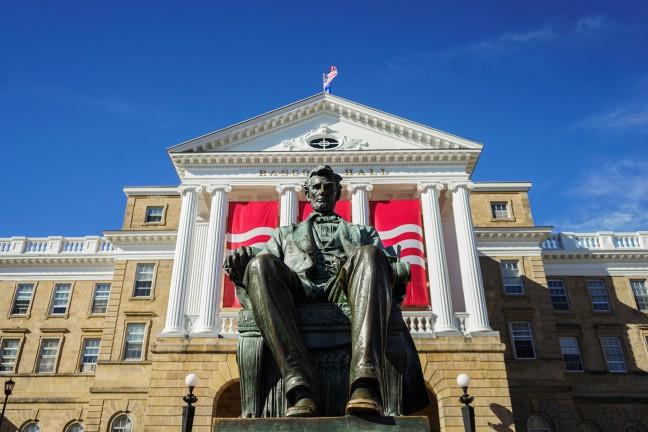For the third year in a row, the University of Wisconsin placed sixth in the National Science Foundation’s 2017 Higher Education Research and Development Survey, a ranking that tracks total research expenditures by universities across the country, the university announced in a press release.
UW saw a 3.1 percent gain in research expenditures overall, with 0.6 percent gain from federal funding, a 7.3 percent gain from businesses, an 8.8 percent gain from non-profits, and a 9.1 percent gain from institution funds. One decline, however, came from local and state expenditures, which dropped by 11.3 percent. Expenditure categories were labeled based on the source of their funds.
The interim Vice Chancellor for Research and Graduate Education Norman Drinkwater, believes the future for research and development at UW is bright.
“Our robust research culture makes it possible for us to attract the best and brightest scholars from students to staff and faculty,” said Drinkwater in the release.
At $1.19 billion dollars, the UW’s 2017 research expenditures are the largest the university has ever reported, Office of Research and Graduate Education spokesperson Natasha Kassulke said.
The previous largest research expenditure came in 2012, when the university spent almost the same amount, and ranked third in the HERD survey, according to a 2013 university press release.
Two years ago, UW lost its top-five survey ranking, a position it had previously held since the rankings started in 1972, Kassulke said.
“I hope we continue to see an increase [in research expenditures],” Kassulke said. “It would be nice if we could see it in all areas, including state funding. I think it’s a goal for all of us to strive to get back into the top-five.”
According to the public NSF data, a little over half of the research expenditures came from federal funding, which includes funding through research grants. Another $394 million came from institution funds.
The data also showed the important role nonprofits have in enabling research at UW. In 2017, nonprofits including the Wisconsin Alumni Research Foundation and the UW Foundation contributed a total $104 million towards research. WARF acts as UW’s official patent licensing arm, while the UW Foundation handles donations to the university.
UW receives donations from 70 to 80 thousand individuals every year through the UW Foundation, according to Alisa Robertson, Senior Vice President and Chief Advancement Officer at the UW Foundation.
“Our goal is really to work with alumni and other donors, who are interested in making gifts to support either the research or educational mission of the university,” Robertson said.
Sometimes a donor will set up a professorship as a means of recruiting and retaining outstanding faculty members conducting research in a particular field, Robertson said.
Robertson said other times, donors will support specific projects.
“Maybe there’s a faculty member who’s working on really interesting research, but their research isn’t far enough along to apply for one of these grants that come from a government agency,” Robertson said. “A donor may provide a sort of seed funding, as a gift to help that researcher get their findings a little along so that they’re in a position to apply for a federal grant.”
Foxconn invests $100 million in UW research, announces partnership
The competitive nature of federal grants often forces researchers to get creative. This has led the office of research and graduate education to bring together researchers from different fields to look at complex problems, Kassulke said. Promoting interdisciplinary research is one way UW’s grants remain highly competitive.
In recent years, the university has taken steps to reduce the administrative burden on faculty so that they can spend more time conducting research and writing grants, Kassulke said.
UW has recently secured funding awards for a diverse spectrum of research projects, ranging from from detecting neutrinos, to developing of alternative fuels, to studying neurodegenerative diseases such as alzheimer’s, Kassulke said.
“We’re seeing really big grants come through that haven’t even been reflected yet in the rankings,” Kassulke said, referring to how HERD rankings only track money that’s already been spent.
In wake of cuts to federal research funding, UW develops new research submission tool
While funding at the federal level is growing, the same could not be said about state and local funding. The decline in that category has led UW-Madison to seek more funding from industry, Kassulke said. The agrochemical company Monsanto’s recent donation of their local $10 million plant laboratory and the tech giant Foxconn’s recent $100 million research investment illustrate this trend.
Local industries have also donated to the university. Wisconsin’s potato industry recently committed $5 million toward UW’s vegetable research program, a testament to strong relationship between the two.
“When industry partners come in, they obviously have a particular area of interest, and we would be building our research in those areas,” Kassulke said.
Kassulke noted that the rankings do not always show the whole picture.
Survey results can be skewed by changes in how data is reported. Kassulke brought up the case of Penn State, which jumped into the top-five research rankings right after they began including research expenditures form their school of medicine in their total.
“There are many rankings,” Kassulke said. “It’s not the complete story of our success in research.”

















